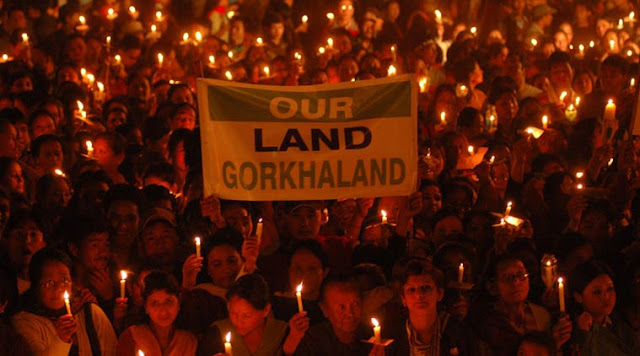Darjeeling 12th July 2016 Tomorrow we celebrate Bhanu Jayanti, in honour of the 1st poet to write and publish in what is today known and regarded as Nepali language. This will be the first time that Bengal government is officially celebrating Bhanu Jayanti since India became Independent.
There is a reason behind it.
Municipal elections are set to be held in December and GTA elections next year and TMC fancies it is in with a chance to win political mandate in the hills, hence Bengal CM Mamata Banerjee accompanied by the President Pranab Mukherjee, who also happens to be Bengali, are going to celebrate Bhanu Jayanti as a Bengal government sponsored jamboree this year at Chowrasta.
There are multiple layers of hypocrisy in Bengal government holding this event, and had ours been a more self-respecting community, we would boycott this indirect slap on our faces. But given that some of our people have sold their self-respect for a few crore rupees, I am certain that there will be a massive crowd present tomorrow to cheer and hoot to everything that Mamata says.
Despite repeated requests for including Nepali as an Optional paper in WBCS, the Bengal government has turned a complete blind eye and deaf ears to our request, yet tomorrow when Mamata announces how the Bengal government is a champion of Nepali language, the sellouts from our hills in attendance will welcome her every word with a rapturous clap of hands.
Ever since Mamata came to power, there has been a deliberate attempt at undermining Nepali language at each and every turn. The government forms are printed in Bengali, scholarship sites have only featured Bengali language, all the government signs and majority of the posters are written in Bengali, and now even the ration cards are being printed in Bengali. Yet tomorrow, when Mamata announces how she has promoted the use of Nepali and Nepali language, the sellouts from our hills will dance and celebrate.
Tomorrow, Mamata will again claim "Pahar Hasche" and indeed the news channels will show the laughing, smiling face of sellouts - but what she won't tell you is that, Bengal government has not conducted Panchayat elections since 2000 in the hills, that over 500 Panchayat posts are remaining vacant in the hills, that for the past 15 years there have been no promotion granted to any hill panchayat employee, while Panchayat employees from the plains are being gradually transferred to the hills. Same is the case with schools where over 2500 vacancies have not been filled since 2001. Schools are running without headmasters and colleges are running without any principals. Same is also true for almost every other government department, where permanent posts have remained vacant for decades.
Tomorrow, Mamata will again promise numerous development projects in Darjeeling region, but what she won't promise is the equal treatment of Nepali language or Nepali speaking people in Bengal. She won't promise that the next Chairman of PSC will be from the hills, she won't promise that the next VC in any of the Bengal based universities will be a hill academic. She won't promise that non-Bengali students and youths will be provided with equal opportunity, she won't promise that they will be given equal benefits, and she won't promise that these children will have a bright future in Bengal. While students in the plains are given Kanyashree and Sabujh Saathi, hill students are deprived of even most basic of all needs - text books, that itself should be telling.
Most hypocritical of all though is the fact that Bhanu Bhawan, which is built in the honour and memory of Kabi Bhanu Bhakta Acharya is 5 minutes walk away from Chowrasta, which has a massive hall where such functions could be undertaken, but no that wouldn't assuage Mamata's ego, would it? She had to dig up and destroy Chowrasta so that she could send proper visuals back to Kolkata and non-Nepali speaking homes and proudly claim "Pahar Hasche" and our sellouts would indeed be laughing like mentally challenged retards who don't know right from wrong.
Via TheDC







%2Bsilver%2Bjubilee%2Bcelebrations%2Bbegins%2Bwith%2Bcall%2Bfor%2Bcreation%2Bof%2BGAC.jpg)



